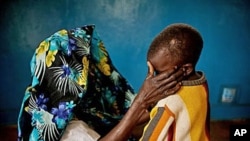A high-level panel on victims of sexual violence is calling for the establishment of a reparation fund for thousands of rape victims in the Democratic Republic of Congo (DRC). A new United Nations report finds that rape victims suffer from stigmatization, lack of medical and psychological care and are given little or no access to justice.
The 55-page report finds victims of sexual violence in the DRC are victimized by those who rape them and by the society that spurns them because they have been violated.
The three members of a special high-level panel appointed by the U.N. High Commissioner for Human Rights heard the testimonies of 61 survivors of sexual violence. The victims range in age from three years to 61 years, including four male victims.
During the course of a 17-day field visit, the panel went to seven locations in three different provinces in eastern DRC and to the capital, Kinshasa.
U.N. Deputy High Commissioner for Human Rights Kyung-wha Kang, a member of the panel, says the lives of the rape victims have been largely destroyed by their experiences.
“This victimization is compounded by the stigma they often face in families and communities. Rejected by their husbands and socially ostracized,” Kang said. “Victims of sexual violence are left to fend for themselves, often living on the streets. Their stigmatization is further compounded by fistula, pregnancy resulting from rape, and the contraction of sexually transmitted diseases, including HIV/AIDS.”
The victims repeatedly told the panel members that health care and education for their children and themselves were among their highest priorities. They said they could not seek justice through the legal system as they could not identify or locate the perpetrators.
The report says victims expressed great frustration because many of the people convicted of the sexual assaults have escaped from prison, while the victims have received no reparation or payments for the harm done to them. The panel recommends that greater efforts be made to bring perpetrators to justice, including military officers with command responsibility.
Deputy High Commissioner Kang says there is no way to erase the harm suffered by victims of sexual violence. But, she says that addressing their losses is the starting point for reparations.
“While many of the needs are costly and require resources, there are other forms of reparation that would cost almost nothing and have a great impact in restoring dignity and giving some sense of justice to the Congolese women and men who have suffered the stigma of sexual violence. Public recognition of the harm and public expression of support for them, particularly at the highest levels of government will go a long way to help change the culture that blames victims of sexual violence rather than blaming their perpetrators,” Kang explains.
The panel recommends a fund be set up to support reparations as a matter of priority. It says both individual and collective reparations, in the case of mass rapes, be provided for in the fund.
The panel suggests the fund should include representatives of the DRC government, the United Nations, donors, civil society, and survivors themselves. It says the survivors of sexual violence are in the best position to know what they need and how the money should be used for their benefit.
UN Panel Calls for Fund to Help Rape Victims in DRC













